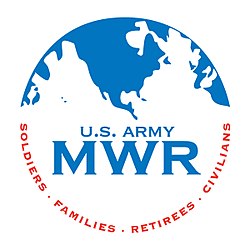United States Army Family and Morale, Welfare and Recreation Command
| Family and MWR Programs | |
|---|---|
|
Soldiers, Families, Retirees, Civilians
|
|
| Active | 2011 – present |
| Country |
|
| Allegiance | United States |
| Branch | United States Army |
| Part of |
Department of Defense |
| Nickname(s) | MWR |
| Website | Official MWR News |
Department of Defense
Department of the Army
The United States Army's Family and Morale, Welfare and Recreation (MWR) Programs are executed within the Installation Management Command G9, Family and MWR Directorate, following the deactivation of the Family and Morale, Welfare and Recreation Command on 3 June 2011 in a ceremony at Fort Sam Houston. According to the organization's official mission statement, IMCOM G9 delivers "quality Family and Morale, Welfare, and Recreation programs and services supporting the readiness and resilience of the All-Volunteer Army."
According to U.S. Army Regulation 215-1, Army MWR is a quality-of-life program that directly supports readiness by providing a variety of community, soldier, and family support programs, activities and services. Included in MWR are social, fitness, recreational, educational, and other programs and activities that enhance community life, foster soldier and unit readiness, promote mental and physical fitness, and generally provide a working and living environment that attracts and retains quality for U.S. Army soldiers, family members, retirees and its civilian workforce.
The range of MWR programs offered at Army garrisons is based on the needs of authorized patrons who work and reside there. Programs are managed by garrison commanders within the framework of authorized and available appropriated and non-appropriated funds. Non-appropriated funds are those funds that are locally generated by MWR programs or provided by Installation Management Command (IMCOM) region directors and/or the Family and MWR Programs. AAFES dividends are also a source of non-appropriated funding.
Each MWR program is classified by category. Categories are determined by their effect on the military mission and their ability to generate revenue.
Family and MWR supports combat readiness and effectiveness; supports recruitment and retention of quality personnel; provides leisure time activities, which support a quality of life commensurate with generally accepted American values; promotes and maintains the mental and physical wellbeing of authorized personnel; fosters community pride, soldier morale, and family wellness and promotes unit esprit de corps, eases the impact of unique aspects of military life, such as frequent relocations and deployment.
Although the United States Army was founded in 1775, Morale, welfare, and recreation programs did not exist for the Army until the start of the twentieth century.
...
Wikipedia

